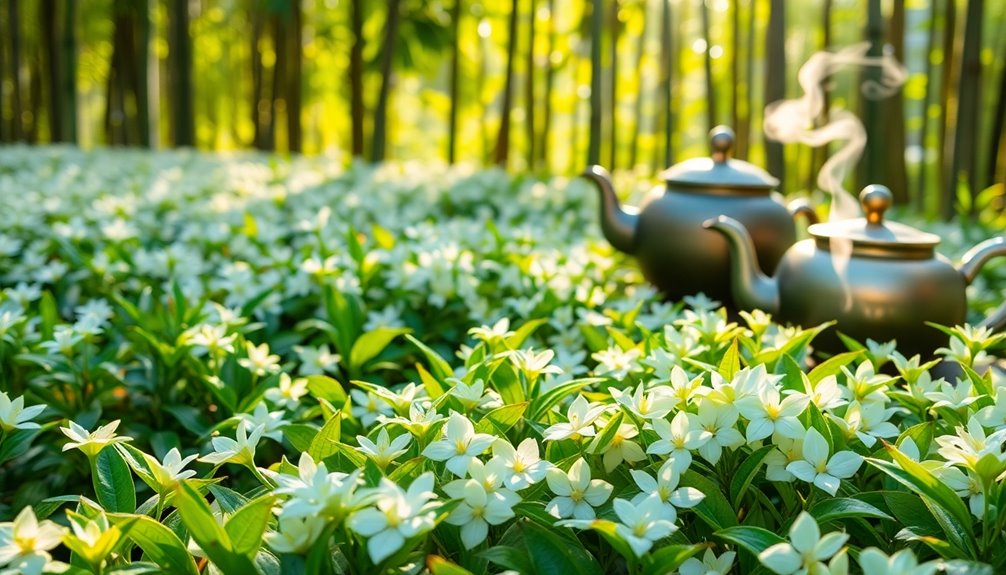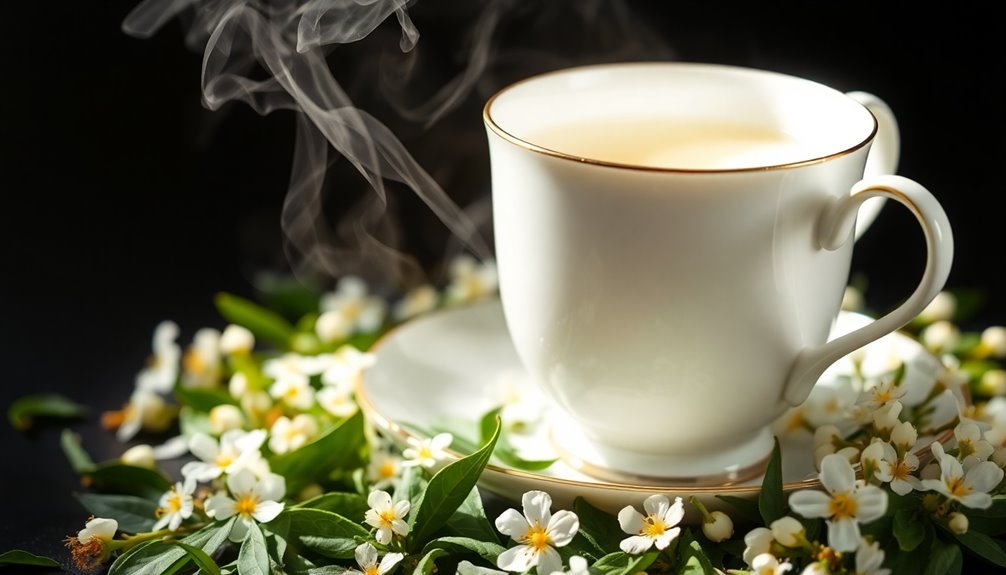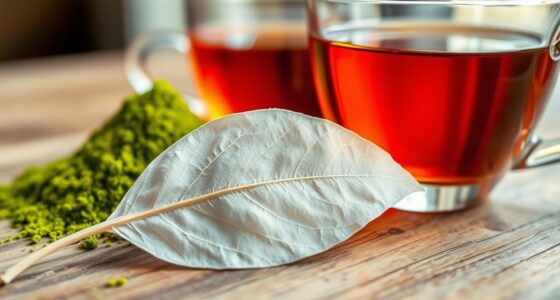White tea plays a vital role in Traditional Chinese Medicine by helping to cool the body and restore balance. It's rich in antioxidants, which help detoxify and boost your immune system. This tea is known for balancing yin energy, promoting mental calmness, and easing stress. It's especially helpful after heavy or spicy meals to aid digestion. In Chinese culture, white tea symbolizes harmony and is enjoyed in social settings. Although some scientific debates continue, its historical use in medicine supports its benefits. Keep exploring to discover more about this delightful tea and its many uses!
Key Takeaways
- White tea is used in Traditional Chinese Medicine (TCM) to detoxify and clear toxins from the body, promoting overall health.
- Its cooling properties help alleviate symptoms of excess heat, such as dry skin and restlessness.
- The natural compounds in white tea combat oxidative stress, enhancing the immune system's function.
- White tea supports mental calmness and relaxation through its L-theanine content, reducing stress levels.
- It is recommended for balancing yin and yang energies, especially after heavy meals or during warm weather.
Introduction
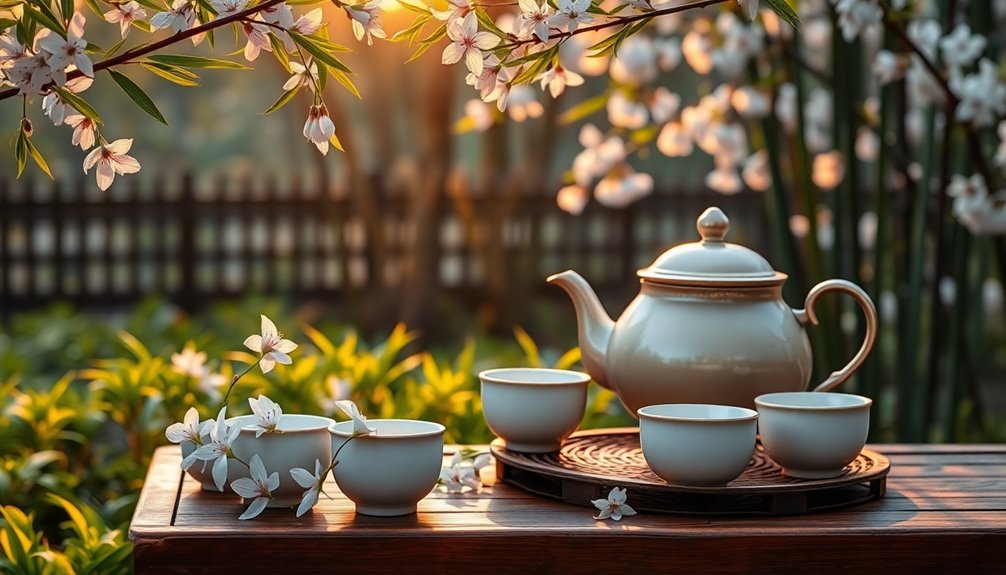
In Traditional Chinese Medicine (TCM), white tea holds a special place due to its cooling properties and ability to promote balance within the body. You mightn't realize it, but drinking white tea can be a simple way to support your health. TCM values this tea for its role in alleviating conditions tied to excess heat, like dry skin or restlessness.
By promoting the balance of yin and yang, white tea helps regulate your body's qi, or life-energy.
When you sip on this delightful tea, you're also giving your immune system a boost. The high levels of antioxidants and polyphenols found in white tea are believed to enhance your body's natural detox processes.
TCM practitioners often recommend drinking white tea after enjoying heavy or spicy foods, as it helps clear internal heat, aids digestion, and restores balance.
Plus, regular consumption of white tea can support your mental clarity and reduce stress. This aligns perfectly with TCM's focus on maintaining a harmonious state of mind for optimal health.
Traditional Healing Practices
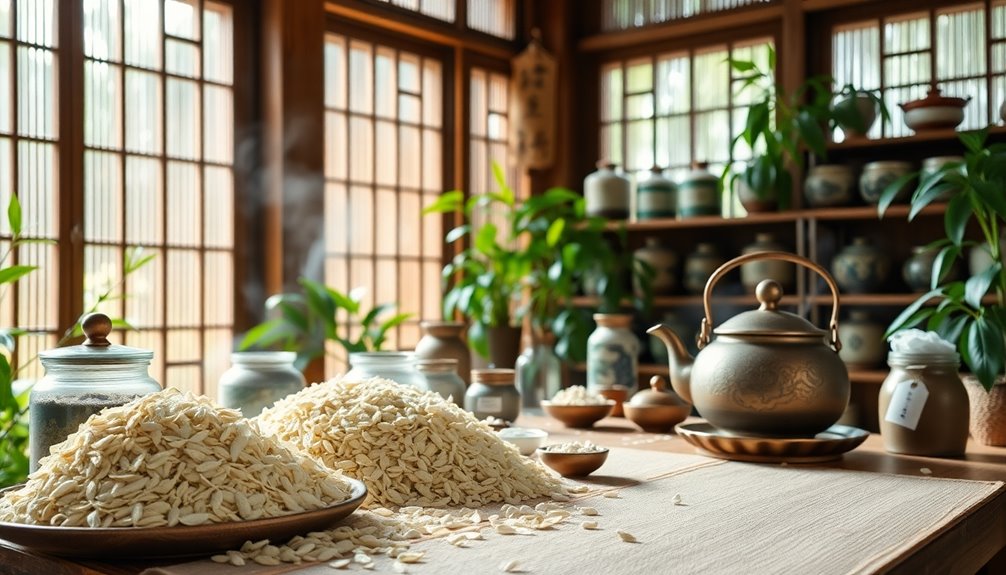
Harnessing the ancient wisdom of Traditional Chinese Medicine, white tea serves as a valuable tool in various healing practices. This delightful beverage is known for its cooling properties, which help alleviate excess yang conditions like dry skin and restlessness. When you drink white tea, you might find it eases internal heat and promotes balance in your body.
In Traditional Chinese Medicine (TCM), white tea is recommended for detoxification. Its natural compounds work to clear toxins, boosting your body's ability to fight infections. Plus, the antioxidants in white tea, especially catechins, combat oxidative stress, which can keep you healthier overall.
You'll also appreciate how white tea supports mental clarity and calmness. With lower caffeine levels and higher amounts of L-theanine, it encourages relaxation without the jitters.
Yin Energy Balancing Properties
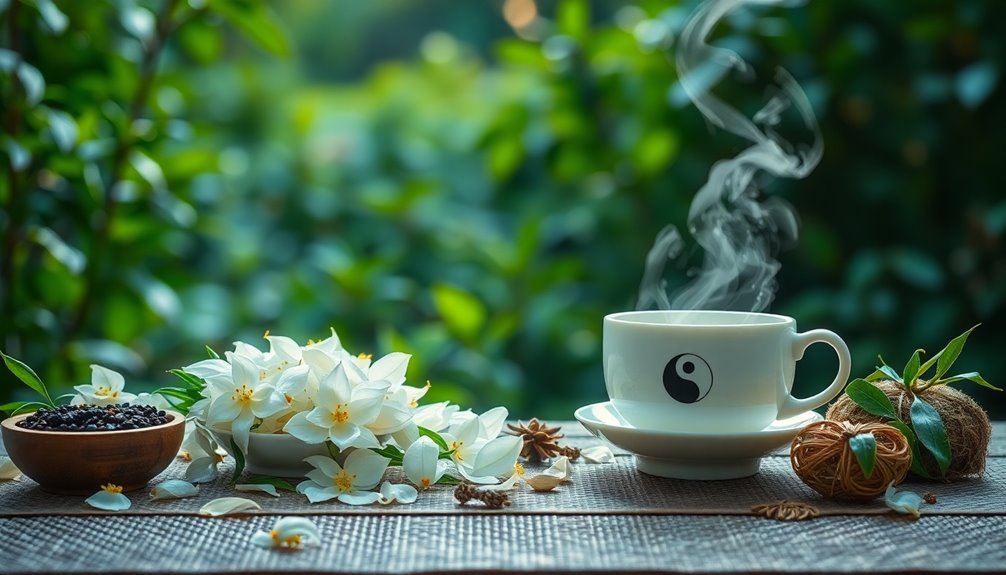
White tea plays a crucial role in balancing yin energy, which is vital for maintaining harmony within the body. In Traditional Chinese Medicine, yin energy is linked to cooling, calming, and restorative qualities. When you consume white tea, you help regulate this energy and counteract excess yang, which can lead to heat and inflammation.
The cooling properties of white tea make it perfect for easing symptoms of excess heat, like dry skin and restlessness. These soothing effects come from its rich composition of catechins and antioxidants, supporting your body's ability to find balance.
When you're feeling hot or uncomfortable after a heavy meal, sipping on white tea can help clear that internal heat and ease digestive issues.
TCM practitioners often recommend enjoying white tea during warm weather or after big meals. By promoting yin balance, you can enhance your overall wellness, reduce stress, and lift your mood.
It's all about creating harmony within yourself, and white tea can be a delightful part of that journey. So next time you're looking for a refreshing drink, remember the wonderful benefits of white tea for your yin energy!
Symbolism in Chinese Culture
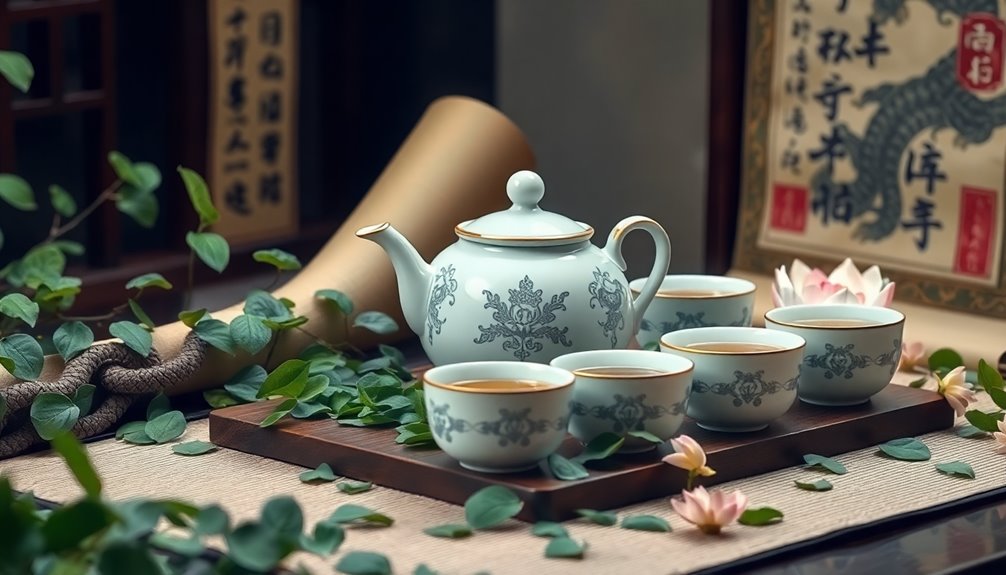
Tea, especially white tea, carries profound symbolism in Chinese culture, representing harmony and balance. In traditional Chinese medicine (TCM), the concept of yin and yang is vital for maintaining health. White tea embodies this idea with its gentle nature, promoting a sense of calm and tranquility.
It's often associated with purity and elegance, thanks to its delicate processing and beautiful appearance, making it a favored choice for ceremonies.
When you hear the phrase "Tea is a treasure," it shows how deeply people appreciate tea's role in social interactions. Drinking white tea isn't just about the taste; it's also a way to foster connections and strengthen relationships. Historically, white tea was a drink for nobility and emperors, emphasizing its status as a symbol of wealth and refinement.
Moreover, the act of drinking white tea is seen as a meditative practice. It encourages mindfulness and reflection, aligning perfectly with the values of traditional Chinese philosophy.
Research on Efficacy Debates
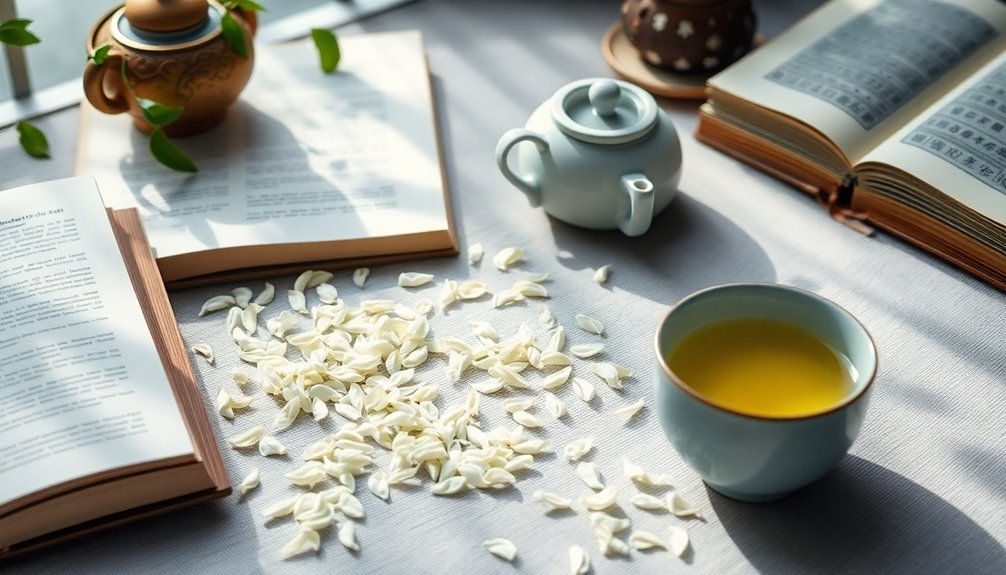
Debates surrounding the efficacy of white tea in traditional Chinese medicine (TCM) highlight both its historical significance and modern scientific inquiries. Many practitioners believe that white tea helps to cool the body, making it useful for conditions like dry skin and restlessness. They also think it supports the regulation of qi, which is essential for health and balance.
Research shows that white tea is rich in catechins, which may offer anti-inflammatory and antioxidant benefits. These findings align with TCM's claims about white tea promoting internal balance. However, the health benefits of white tea aren't fully agreed upon in the scientific community. While some studies suggest positive effects, many researchers argue that more evidence is needed to prove its effectiveness for specific health issues.
Despite the ongoing discussions, the integration of white tea into TCM practices reflects its long-standing use for colds and fevers.
As you explore the role of white tea in TCM, remember that while traditional beliefs are valuable, modern science is still working to validate these claims. It's an exciting area of study that continues to evolve!
Practical Applications
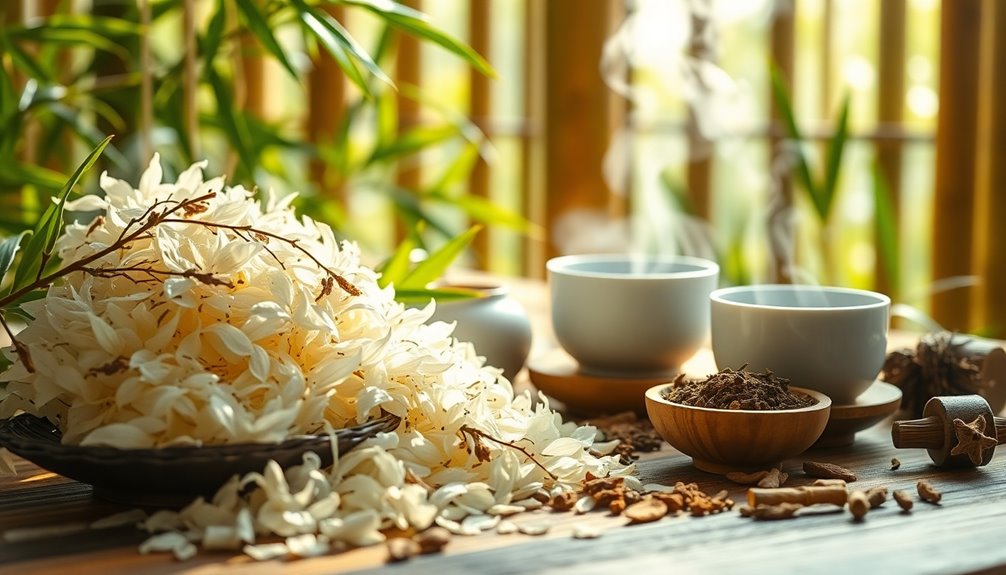
Incorporating white tea into your daily routine can offer a range of practical benefits rooted in Traditional Chinese Medicine (TCM). This delightful beverage is known for its cooling properties, making it a great choice when you're feeling hot or restless.
If you often experience dry skin or fatigue, sipping on white tea can help relieve those symptoms and restore balance to your body.
White tea is believed to support the regulation of qi, or life-energy, which can enhance your overall vitality. Plus, its natural antibacterial and antiviral properties boost your immune system, helping you stay healthy and fend off infections.
To maximize the health benefits, consider pairing white tea with lighter foods, especially after heavy meals. This combination can help clear internal heat and promote wellness.
You might want to enjoy a warm cup of white tea in the afternoon or replace sugary drinks with this refreshing option.
By making white tea a part of your daily life, you're not just indulging in a tasty drink; you're also embracing the wisdom of TCM and reaping its many health benefits.
Frequently Asked Questions
What Is Chinese White Tea Good For?
Chinese white tea's great for boosting your immune system, improving skin health, and enhancing mood. It helps detoxify your body, manage weight, and promote cardiovascular health, making it a refreshing choice for overall well-being.
What Does the White Tea Symbolize?
White tea symbolizes purity and tranquility. When you consume it, you embrace its calming essence, balancing your inner energy. Its delicate nature reflects youthfulness, reminding you of vitality and the importance of nurturing your well-being.
What Tea Is Used in Traditional Chinese Medicine?
In Traditional Chinese Medicine, various teas are used, including green tea for detoxification, oolong for digestion, and black tea for energy. Each type offers unique benefits, so you can choose based on your health needs.
How Many Cups of White Tea Should You Drink a Day?
You should drink 3 to 5 cups of white tea daily to enjoy its health benefits. This moderate intake helps boost your immune function and supports detoxification, enhancing your overall well-being and energy without overstimulation.
Conclusion
In conclusion, white tea plays an important role in traditional Chinese medicine by helping to balance yin energy and supporting overall health. Its rich history and cultural significance show just how valued it is. While research on its effectiveness continues, many people enjoy drinking white tea for its potential benefits. So, why not give it a try? You might find that adding white tea to your daily routine brings you a bit of wellness and joy!

